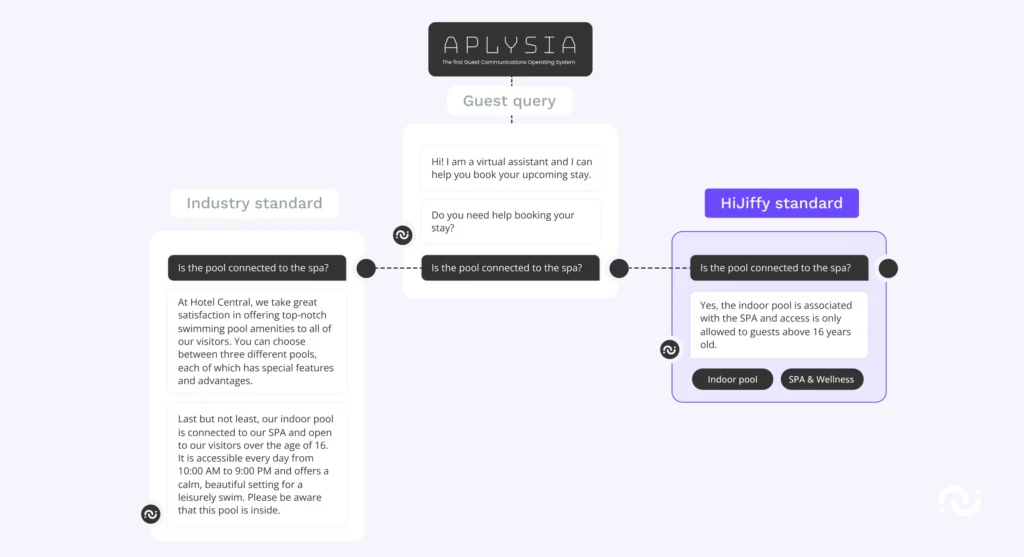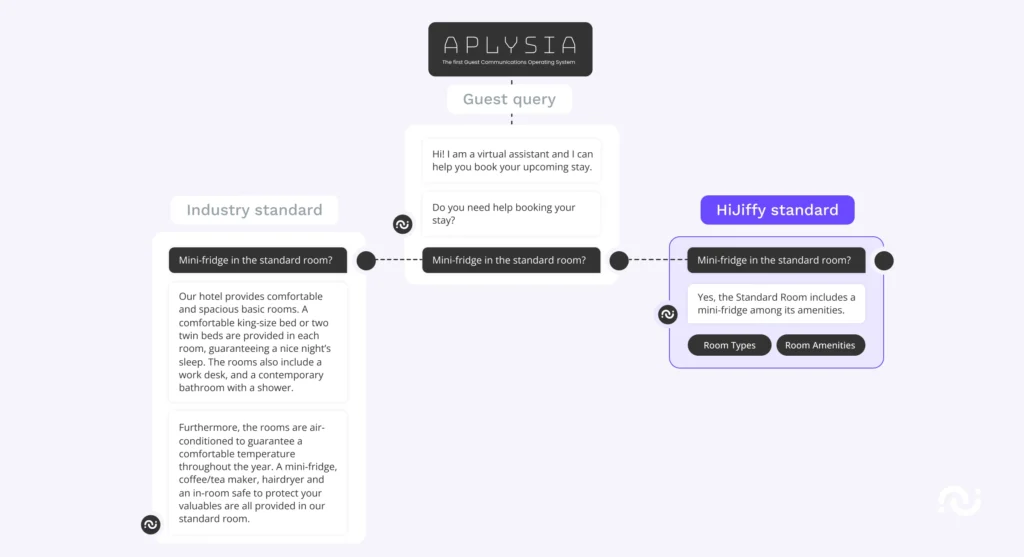All cards are on the table. What's your pick?

Our AI incorporates a cutting-edge generative technology suite featuring renowned Large Language Models (LLMs) from industry leaders like Anthropic, Google, OpenAI, and Mixtral, all unified under HiJiffy’s Aplysia. Such models have revolutionised natural language processing in recent years allowing machines to understand and generate seemingly human-created text with unprecedented accuracy. These AI models learn to generate text by identifying patterns in massive amounts of text data, resulting in their capability to produce output indistinguishable from one written by a human.
The advanced conversational capacity of the new version of Aplysia was developed to enable user interactions in natural language and even more personalised responses to user queries. Built using a cutting-edge AI architecture, HiJiffy’s Guest Communications Hub has increased efficiency in providing direct and specific answers to user questions and, significantly, in ensuring their accuracy and alignment with factual information about the hotel.
This development within Aplysia will boost your guests’ satisfaction thanks to the personalised and focused answers, and building on this, your hotel staff will benefit from the reduced volume of guest queries to process.
Whether you need a chatbot that answers questions about the hotel or a virtual assistant that increases your revenue, HiJiffy’s upgraded Guest Communications Hub is a reliable and effective solution for all your guest communications needs.
To illustrate these brilliant new capabilities of Aplysia, let’s take a closer look at how they work in practice.

As illustrated, HiJiffy’s solution now has the capacity to filter available information about the hotel to provide a direct specific answer to guest queries. If they wish to access further information, they can do so by clicking on a clearly labelled button, like “Indoor Pool” or “SPA & Wellness” in this example.
Here is another practical example.

As shown here, our improved conversational AI will generate concise and focused answers rather than presenting a lengthy message with additional yet not necessarily sought-after information. Still, further relevant information is suggested if a guest requires to learn more.
In addition to the direct response, our solution will simulate a conversation with the guest, allowing for a more natural and personalised experience.
This new version of our proprietary AI is built on top of the entire framework already developed by HiJiffy, making it a reliable solution.
Client hotels will need to provide essential information about the hotel in a dedicated area of our Guest Communications Hub. They can browse our extensive hospitality FAQs library with over 200 entries and submit information about various topics specific to their hotel. Speeding up the process, the configuration has been made easier for our customers as it will not be necessary to provide descriptive, complete passages of text. Generating such user-friendly output will be the job of Aplysia.
Once all this information is stored in our system, our conversational AI will be ready to delight your guests. Aplysia uses Natural Language Processing (NLP) models and Proximity to better understand the user’s question or questions. They identify the best answer to the user’s question and together create a “knowledge” of the conversation based on the user’s question and the hotel information available in our system.
The “knowledge” and the relevant response obtained allow us to then use the Aplysia technology. This technology was fine-tuned with our rules so we can use it in a safe and thoughtful way to consolidate an answer to the user’s question. Subsequently, our AI-powered guest communications solution will generate the best answer taking into account the knowledge obtained from hotel information and the user’s question.

Large Language Models are one of the most disruptive technologies of the moment and, therefore, it is often considered complicated to control. It sometimes suffers from a term called “artificial hallucination.” This phenomenon refers to a situation when a machine, such as a chatbot, generates an output that appears realistic but is not based on any factual information, such as input from the hotel. Chatbots in the hospitality sector would provide misleading content about the hotel, its services and amenities.
To be a reliable solution for guest communications, our Aplysia needed to address and resolve the challenge of “artificial hallucinations” and our Data Science team took on this challenge.
First of all, the new version of Aplysia is built on top of our existing framework in order to decrease hallucinations and inaccurate answers. Our specialised hospitality NLP models and features like Proximity and Self-learning played an important role in avoiding such situations.
Maintaining the highest level of accuracy of the information based only on the provided input about hotels was our priority when working on developing the newest version of our AI. We run numerous tests and we reached good results only when incorporating our architecture, which prevents the LLMs from hallucinating and providing messages with false or unknown content. If our AI cannot provide an accurate answer, it transfers the conversation to a hotel agent to take over.
ClarityGuard is a system designed to enhance the reliability and accuracy of Large Language Models by addressing “hallucinations” – instances where models produce false or inaccurate information. It incorporates several key mechanisms:
These strategies aim to mitigate the generation of misleading or incorrect content, thereby increasing the utility and trustworthiness of language models in critical applications.

As shown in the above example, the system will swiftly transfer the conversation to a hotel agent if the user tries to start a conversation about a subject that is not specifically linked to the hotel.

Sign up for our monthly newsletter to receive free resources and updates on impactful AI applications in hospitality.